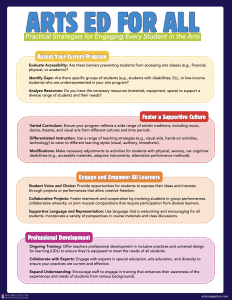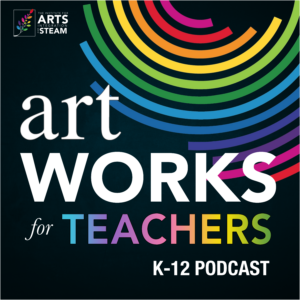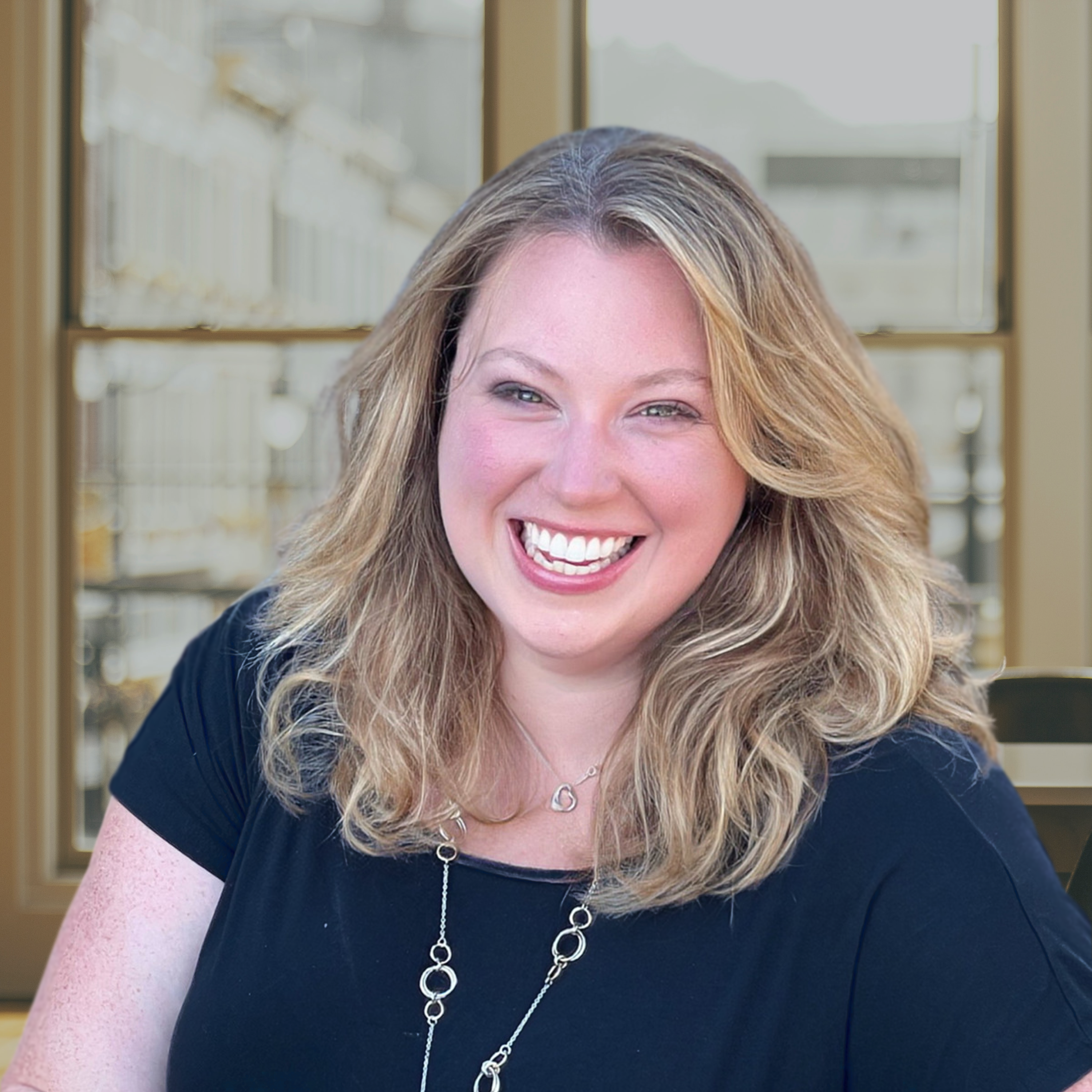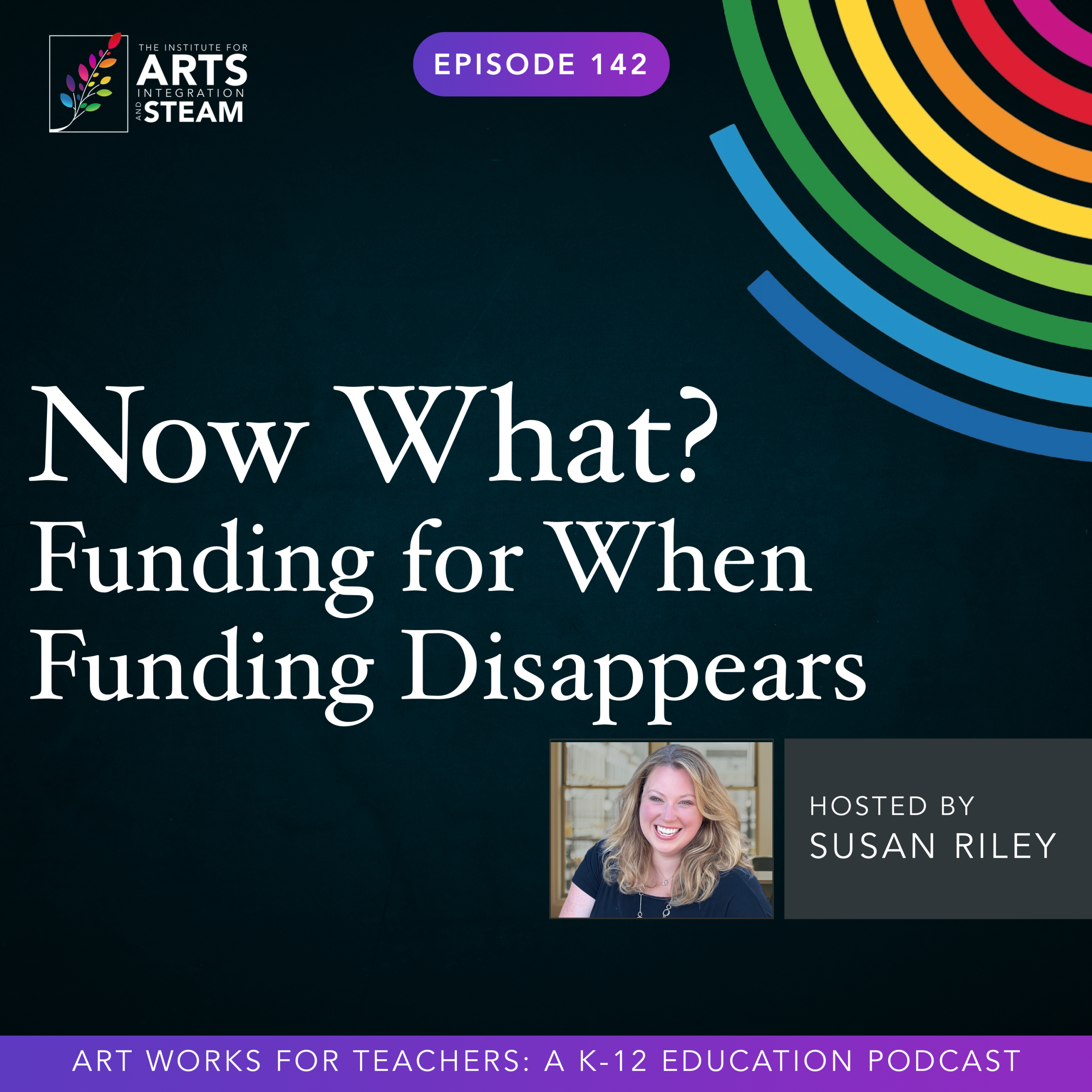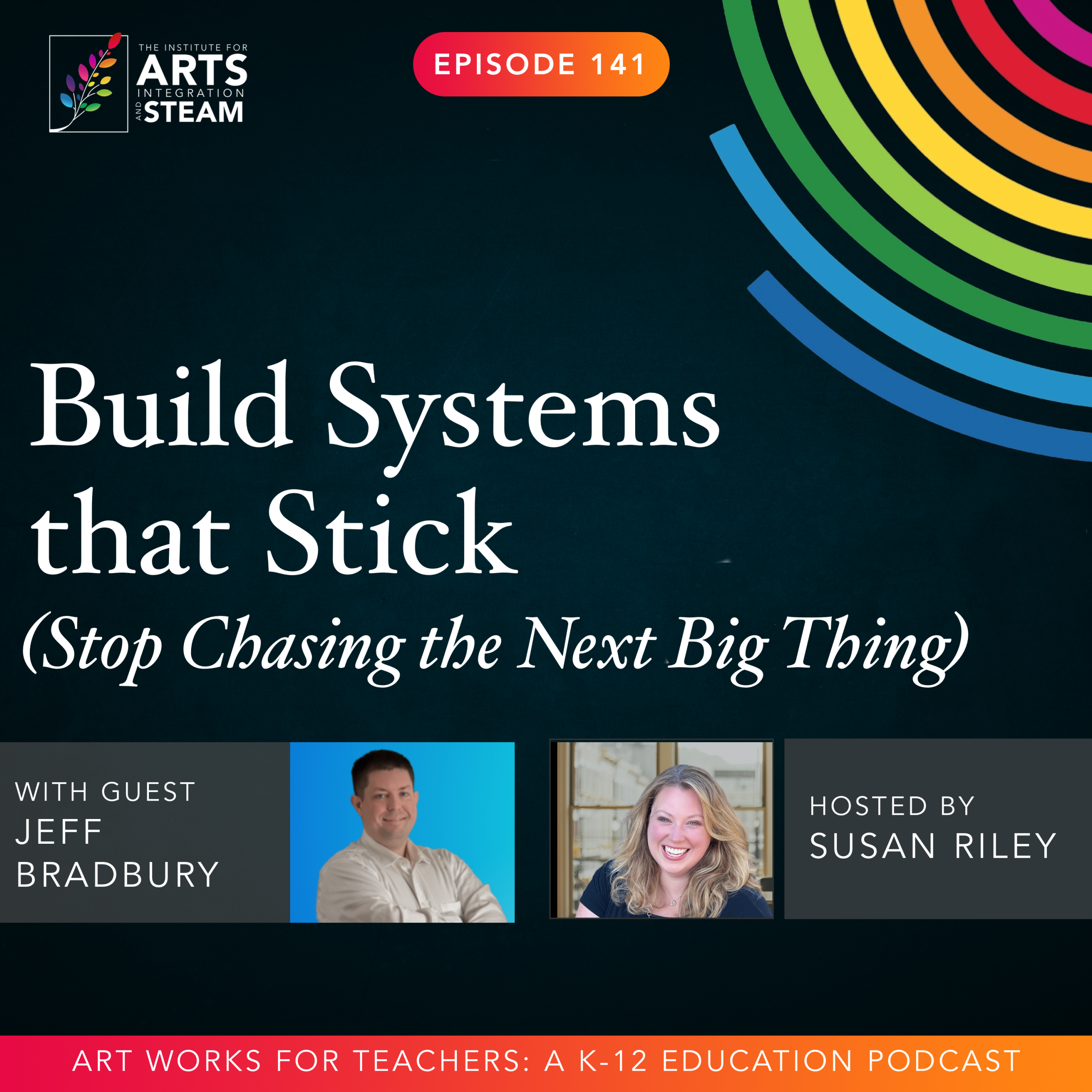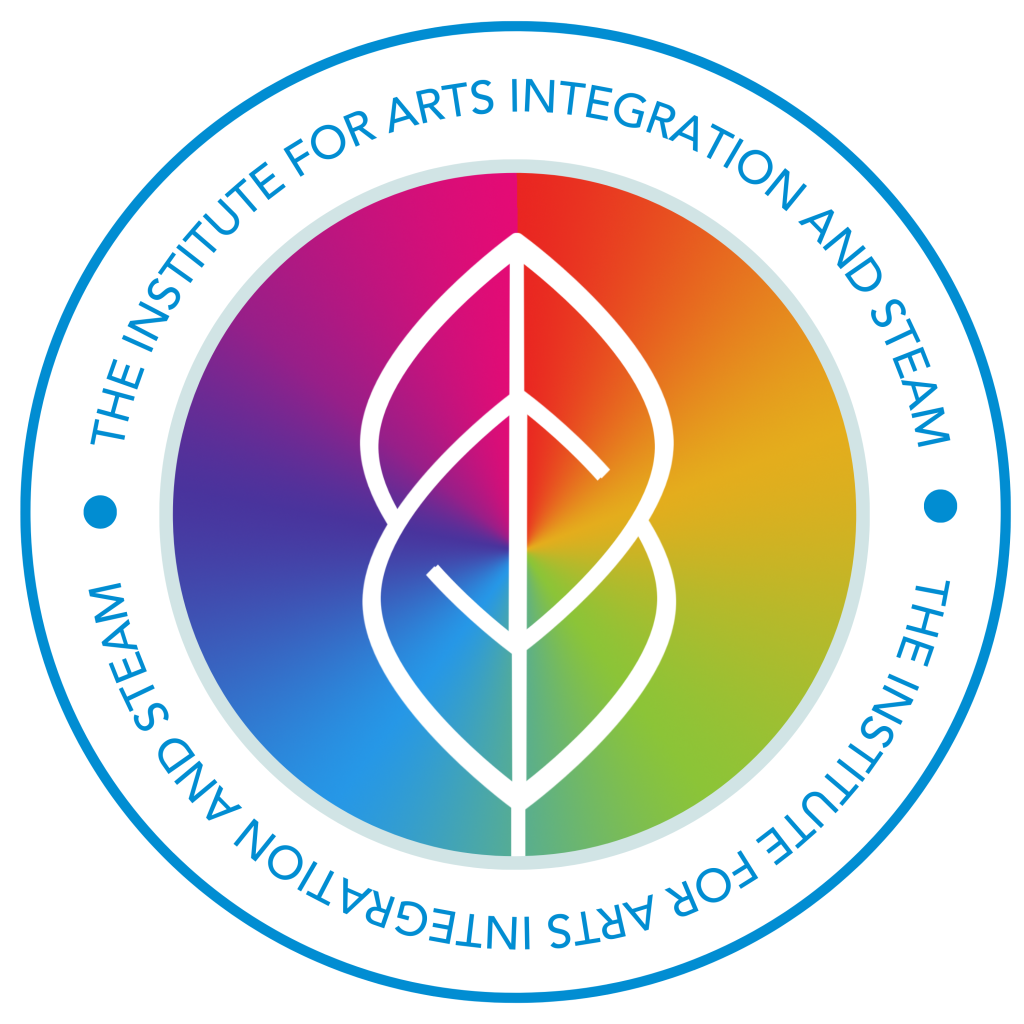ART WORKS FOR TEACHERS PODCAST | EPISODE 125 | 35:54 MIN
Have Confidence and Have Fun
As a first-generation American, Edwin Lovo knows firsthand the barriers many students face in accessing the arts… and he’s on a mission to change that. In this inspiring conversation, Edwin shares how his own struggles shaped his teaching approach, why building student confidence is at the heart of his work, and how we can all advocate for equitable access to music education.
Enjoy this free download of the Arts Ed for All Resource.
Hi Edwin, thank you so much for joining me today.
Edwin
Hi Susan, it’s a pleasure to be here.
Susan
Well, the pleasure is truly all mine. I would love to get started by hearing about your story. Can you tell us a little bit about yourself and your journey into music education?
Edwin
Sure, yeah. So I came from immigrant parents. They’re originally from El Salvador, naturalized now. But being immigrant parents, I was first generation American here. And that usually comes with some sort of struggle, to some extent. And for us, it was a language barrier and also a money barrier. So as a kid, I always felt like we didn’t have enough money to do certain things. And it wasn’t something like I was told constantly, was just something that I felt. I didn’t see myself having the same things as other kids had. that’s also, you as a kid, you sense things differently than as an adult. And I remember as early as I could remember that I wanted to play instruments or I wanted to play music whenever I would watch Looney Tunes or Mickey Mouse shows, I would constantly pay attention to the music.
And when you watch those like Looney Tunes or Mary Medley’s now, it’s the music that really stands out. was kind of a big point of those cartoons. And then later on, maybe around like five years old, six years old, I really remember wanting to play piano. I really remember wanting to play trumpet and saxophone and accordion, harmonica. And little by little, my parents started acquiring instruments, through the swap meet or they would go to the store. I remember being super excited to get this little like little midi keyboard that had a bunch of sound effects and stuff and I remember spending hours just trying to memorize how to play certain songs on it and eventually my grandma got me like a little accordion that I a little toy accordion that I used to play a lot but my school in elementary school didn’t have music until sixth grade
So it wasn’t really an option for me to ask my parents to buy me a saxophone or ask my parents to buy me a trumpet until later, later on. And finally, sixth grade was rolling on and I was super excited. I was like, I’m gonna play the saxophone or I’m gonna play the trumpet, one of those two instruments. And then we moved. We were originally living in Santa Ana and hearing Southern California and then we moved to Anaheim, which is only a 20 minute drive really but the school that we moved to didn’t have an elementary music program at all.
So I went from being super excited to play music to all of a sudden not even having that option anymore. So I had to wait until middle school and the middle school was opening up a new program. They were opening up a piano program for kids to learn and I signed up for that class. So was super excited. Finally seventh grade rolls along and the class doesn’t happen. The class is canceled because it had really low enrollment. So then I was put into a choir class and I was in the choir for about two weeks maybe and I was really enjoying it. I was enjoying singing. The teacher gave me some compliments and I was like, wow, you have a really nice voice, as a seventh grader I had never ever heard before. Especially being a bilingual speaker and not being confident in my ability to really speak too much. And then I didn’t do too well in the state testing going into seventh grade, so then they took me out of choir and put me into a reading class. So then there was no music at all seventh grade either. And then finally for eighth grade, I was like, I’m just gonna join the band. A lot of people signed up for that one. Our band for my junior high was really big. I went to Brooker’s Junior High with Mr. Krauss, a wonderful, wonderful teacher that still inspires me to this day.
And I picked the trumpet. I remember going to a pawns, you know a pawn shop with my parents They said yeah, we’ll go get you a trumpet. We bought a $200 I remember it’s a modi brand from the Czech Republic I get I received the trumpet I got into the car and I immediately took it out and I started making funny trumpet noises on it I was so excited and I practiced the heck out of it the semester rolled through and I was progressing a lot faster than some of the other students just because
I was excited to practice and play. So then they were gonna put me into the advanced band, but there was too many kids in that one, so they put me into the intermediate band, and I was just excited to even be there. Funnily enough, another student that was in that band was also at my school in Santa Ana. I hadn’t seen him for like two years, and all of a sudden he had popped up there too, also playing trumpet. Fast forward to high school.
All of a sudden I’m in marching band. I’m a section leader. I have solos. I’m so much fun doing this and I’m starting to think, know, as a lot of times high school kids get pressured into having to choose what are you gonna do when you graduate? What are you gonna do after college? And my thought was, well, I’m just gonna do music. I’m gonna figure out what to do with music. I like playing it. I like being around it. I enjoy the teacher teaching me, teaching, you playing music. So my option then was I’m just gonna go to school to play trumpet and learn how to teach music. So then I did. I went to school to play trumpet, teach music. My main happiness I guess around music in high school was playing the trumpet and being around my friends that were also doing the same exact thing and Then I took more interest and I learned my dad all of a sudden came one day because one of his friends at work gave him a saxophone An alto saxophone and I was like, whoa, this is so cool I’m gonna learn the alto saxophone and then I got drumsticks one time and I learned how to play drums I got a guitar because I after watching the movie school of rock. I was like, well that looks super fun I’m gonna learn how to play guitar And that was just kind of my inspiration to play music. Later on I find out that through my dad’s side, his uncles in El Salvador had a brass band pretty much throughout their lives. They would play for fairs, parades, bowl fights back then. And so it’s just kind of interesting that music was in my family, it’s just not really directly in my life. And now…
I love teaching kids, not just kids, I love teaching people how to play music or just give them that confidence, letting them know that you can play this instrument. You might have never seen it before, not even know how to manipulate it, but you can do it. It just takes a little bit of practice and a little bit of patience and a little bit of frustration and eventually you’ll get there.
Susan
My gosh, your story is so inspiring. Thank you so much for sharing it. And I think it’s so representative of many of the journeys that our students take. As somebody who also came from an impoverished background and found music to be that outlet that enabled me to shine, I so resonate with that aspect of your story. I’m curious because I think this is so relevant, especially to where we are right now. When they decided to pull you out of your music class so that you could go back into a reading recovery, if you will, kind of class, do you feel like that that was helpful at all in your reading or do you feel like the music, if you had been allowed to stay in that music class, you would have thrived in a different way and even maybe picked up better reading skills?
Edwin
Yeah, I think if I would have stayed in that choir class, I feel like I would have learned to read a little bit better than having actually been put in that reading class. This is from my prior experience in being in a choir, having to read those specific syllables and the way you specifically phrase things or form your mouth. That I think would have been more beneficial to me at that time instead of putting me back in a reading class that I just found boring to be in a reading class as opposed to, which might have explained my scores back then, but also just growing up, Spanish was my first language and the English was my second language. But yeah, if I would have stayed in that choir, I think it would have been more beneficial to me. However, life happened and I’m happy where I am and I’m glad it happened that way too.
Susan
Yeah. Well, sure. Yeah. I mean, just for those who are listening who don’t quite or they’ve never had that choir experience, like, you know, I went to a choir college. Like I had to sing in like Russian and French. do does that mean that I can necessarily comprehend everything? No. But at this point, I at least am able to recognize. And so being able to expose yourself to language through a musical experience is sometimes maybe even a better way, not necessarily comparable, but maybe even better because it’s working a different area of your brain. So I think that’s such a great point to bring up, Edwin. I’m curious, how did those early challenges that you faced, how has that impacted you as an educator?
Edwin
Great question and it just gives me some perspective and empathy really when I’m teaching I know as a kid growing up then I wasn’t the most confident a lot of times that
When I reflect back to it, I think why was I not really a confident kid? I was always afraid to raise my hand in class. If I did raise my hand, it was like this, as opposed to all the way up. And part of it was because growing up bilingual, I was slower to catch up on English than some other kids, or I would think that I would speak or my phrases would be different than maybe my English speaking teacher that has been speaking English for their whole life. I noticed that I had different ways of speaking and that was just my accent really that I was noticing that was different. I didn’t have as much confidence as I do as an adult and it’s still a learning process of confidence. But knowing that I went through that experience and knowing that humans share experiences, it’s not far-fetched to think that maybe these kids aren’t as confident all the time either. So me going through that experience helps me have the empathy with them of what are they feeling right now learning a new instrument that is completely foreign to them. What are they feeling right now when I’m asking them, can you play this thing? And I’m really kind of putting them on the spot. it brings me back to those times as a kid of being put on the spot, hey, what’s four times six? And all of a sudden you forget everything and you’re like, I don’t know. And then you feel a certain way.
It’s that feeling that I know these students are having sometimes that I just want to make sure that I build that confidence in them so that they have more confidence later that when I do ask them, can you play these notes? Can you play this? Can you play this? Once they start doing it with more confidence, they start doing more happiness also, and it starts inspiring them even more to keep going. So I feel like growing up, that really gave me some perspective with that and also some empathy towards the parents when they come up to me and say, I really want to put my kids into this class but we can’t afford this. Well, we have scholarships here at Arts and Learning, know, come on by. I don’t want any kid to have no excuse, parents to have any excuse not to put kids in some music programs.
Susan
Yeah, yeah, so tell us more about Arts and Learning Conservatory. So now this is where you’re teaching now, correct? And tell us a little bit about this organization, what makes it special, and maybe some of the top experiences that you’ve had there.
Edwin
Sure, so I’ve been with Arts Learning Conservatory, ALC as we call it, let’s see, 2013. It was concurrent with my college days where I started teaching. I went to go do a gig one time. It was a wedding. It was me playing piccolo trumpet and an organist and she asked if I taught music and I said yeah I teach music. So she got me an interview at a private school and through that private school I met Deborah Wondercheck because she was also teaching there. Deborah Wondercheck is the CEO of Arts and Learning Conservatory and she asked if I wanted to teach elementary students because the private school was middle school at that time, but for arts and learning was elementary and I said, yeah, I’m cool to teach elementary. I went over to one of the schools and we had three students. I was like, we need more students than this. I can’t believe there’s not more kids that want to play music. So I asked the school, can I just go around whenever it’s convenient to the teachers, can I just go around class by class and just do like little five minute demonstration of what these instruments are and that you can play these instruments. And then the fast forward two weeks and we went from three students to having 20 students in the class and we had to split the class up into two. So that was already, having that experience right away was very positive for me of, wow, this is something that…
It’s fun for kids and it shows that it’s fun for kids. But I’ve had some great experiences with Arts and the Conservatory, mainly with students that I’ve noticed at the beginning that they don’t have the confidence in playing or they might be super shy or they tell me I have stage fright. And then all of sudden, fast forward to the spring concert and they’re the ones playing the solos, they’re the ones doing great, they’re the ones up there doing a proud that they have these experiences and just to mention one of them, we had a Latin percussion class in one of our communities that is more Hispanic.
So we did a Latin percussion program there and we had this girl that she was about to go on and I wasn’t their teacher. I was just kind of an overseer for that class. But I’d been there a few times so they’re familiar with me. I was also the one that did the assemblies and stuff to recruit the students. And I go up to the student, I crouch down and I ask her, how are you feeling? Are you excited for this? And she’s like, I’m super nervous right now. It’s like, okay, it’s fine to be nervous.
I get nervous before I perform sometimes. But just remember, you’ve been doing this in class, every single time you come to class, you’ve been doing it. Just do that same exact thing. Just tell yourself, I have confidence and just have fun. Be confident and just have fun. And I kind of just left it at that. I kind of just walked away and then I noticed that she was talking to herself and I kind of scooted a little bit closer and she was like, I have confidence and and have fun, confidence and have fun, have confidence and have fun. And was like, wow, she’s actually doing it. And she goes up on stage and she has the biggest smile. She’s playing a cowbell, by the way. That’s all she’s playing. She’s playing a cowbell. She’s going up on stage and she has the biggest smile. Her mom and her sister are up there recording her. She gets off and she finishes the performance and she has just a giant smile that just like melted my heart just because of how big that smile was and just those smile seeing those kids if you ever see kids perform and You they’re nervous to perform for their parents as soon as they’re done playing. There’s a certain facial reaction that happens to them. It’s like a pure Joy sometimes or sometimes pure fear after they’ve been you know finishing and that usually leads to them, you know giving you a very honest reaction sometimes and that’s the it’s that honest reaction that is just the most fun after they’ve been you know they finished playing hot cross buns or something for the first time in front of their parents and then you see that smile pop up on them that they try to hide behind their music stand that’s that brings me so much joy just just seeing them be proud that they just did something
Susan
It’s the best feeling in the world when you can see somebody come out of their shell and step into who they really are. And that moment is just, it’s everything. It’s why we do what we do, I think. I would love for you to expand a little bit about ALC’s mission. I know it’s pretty special in that I don’t think anybody who wants to participate in the arts is ever turned away, even if it’s a financial struggle. So can you talk about that a little bit and talk about how that model works?
Edwin
Yes, of course. So Arts and Learning Conservatory, we rely a lot on scholarships and being able to provide scholarships, which is a lot of our funding, a lot of our fundraisers, events goes towards providing scholarship money or providing money for so that kids can take these classes for free. A lot of our goal with our mission to provide equitable classes to anybody really, regardless of your financial background, religious background, political, whatever.
Whatever the case may be, we want you to be able to take these classes at no cost or as little cost to you as we can. And if you can’t even afford your instruments, we will try to get you an instrument. If you can’t afford, you you’ve never done this before, that’s fine. We will teach you how to do it. And we rely, like I said, a lot on donations. And when we have students that don’t, can’t afford, parents can’t afford to take a class, if it is a tuition-based class, we try our hardest to get the parents to register or to sign up for scholarships. I know when I do my recruitments and assemblies and speak to parents, I heavily advertise that we have scholarships available because I don’t want anybody to think that we, you that they can’t take a band class, an orchestra class just because they feel like they can’t afford it. So this model is very important just to give people the confidence that they can take these classes and that they shouldn’t worry, we don’t want them to worry about their finances when doing something that I feel or that I think is something that is part of our human nature. Music, I think it’s just part of being human.
And I don’t want anybody denied that option. Even other performing arts, have theater, have have choirs, we have acting classes. I don’t want any students to be afraid or any parents to not want to feel like they can’t take these classes. So our mission is very important in having parents see that they can do things, feel that they can take these classes. And that’s why our donations are very important, because it just goes more towards having people having students take more music classes, more arts classes, and more theater classes.
Susan
Yeah, absolutely. And I think being a part of that, knowing that money is sometimes the biggest obstacle for people in allowing and unlocking opportunities and to remove that barrier provides such a wonderful entry point for people who may not have otherwise had that experience. So I applaud that effort tremendously. Beyond teaching, I know you’re out in the community and you’re recruiting, right? And you’re also advocating for arts education, which as you shared at the beginning is sometimes the first thing to get cut in difficult budget times. So I’m curious, what strategies do you use to both advocate for arts education and also get kids excited about music and wanting to participate?
Edwin
Sure, so let’s start with that one of how do I get kids to want to participate? Because it’s not easy all the time to roll up to a school, have all your instruments, and expect all of the kids to be excited for you or for coming to an assembly. A lot of times, they’re just excited to get out of class. So I want to go with that excitement. I want to use that excitement of the kids getting out of class and being at an assembly or being at a thing that’s different. And one of the things that I like or that I try to remember when I’m doing these assemblies or doing the recruitment or being in front of kids is just myself having fun with what I’m doing. If I can essentially play my instruments, if I play the trumpet, play the flute.
If I play the trumpet or play the flute or play the clarinet, play the violin, I want the kids to see that I’m having fun playing those instruments or hear that they recognize a song. playing songs that are recognizable is always a great strategy. Essentially, making them part of the assembly is also a great strategy of having them hold the instrument, having them even play the instruments if possible. thing that I like to do is I like to bring out the violin and bring out the cello and I have a tiny student come up and ask them, which one do you think is gonna be super heavy? And obviously they’re gonna point to the cello and I ask them to pick up the cello and they could pick it up pretty easily. It’s like, wow, you can pick up the cello? That’s so cool. That’s great that you can pick up this instrument that looks super heavy, it’s really not that heavy. And other kids start to visualize themselves playing those instruments. And what was your first question, by the way? I kind of forgot it.
Susan
I think, well, let’s just pause here for a second. think kind of busting through the myths that students might have about some things. And, you know, it’s never a bad thing to use Bruno Mars or whatever. It’s exciting, right? So I love that you’re bringing in current music and also trying to make that relational connection with our students, which is the hallmark of great teaching.
Edwin
Exactly. Yeah. Exactly.
Susan
The first question I asked was about how do you advocate for arts education as a whole? How do you, I know that fundraisers have to be so important in order to support the mission of ALC, but I’m sure advocacy is a part of those fundraisers as well as outside of that. How do you go about advocating for the importance of arts education?
Edwin
Sure, so an important way that I think is a really great way for people to see is actually having the kids performing or seeing the actual results of what these classes can do. We’ve had a lot of students go through our classes. They come in not knowing any music. come in having experience. They come in having extracurricular activities. it’s not always, you don’t always get to see the fruits of your labor, but when you do, they start third grade and then they move on to middle school and high school and you see this much taller human being now and they have a certain way about them or they’re now going to go into engineering or they’re going to go into music, or they’re gonna do whatever they might do, it’s great to see that growth in them. And the more growth that you show happening because of music, and the more confidence, again, I keep going back to that word, confidence, that is instilled in them, will show throughout the years. And then when we advocate for music, like I said earlier, I think music is just part of our human nature and to deny people of that human nature, especially little kids, is cruel, I guess, to put it in a way. It’s cruel to deny kids of music, especially when music is such an important thing. There’s so many connections going on in your brain when you’re playing music, and there’s so much community that you feel when you’re playing music with other people that it’s hard to…
It’s hard for, you know, when you tell somebody that, for somebody to then tell you, well, I’m sorry, we’re going to cut these programs because we think they’re too expensive or we’re going to cut these programs because we feel they’re not as valuable as math or science when I think music is equally or even more valuable than math and science and music has math and science in it. So it’s, I don’t understand the argument sometimes of why music or performing arts are cut in the first place. It usually goes back to money, but any other reason besides that I don’t think is very valid.
Susan
Yeah, I would agree. I think that if you cut out opportunities for students to thrive in any area, if that’s music, that’s you’re stealing from them long term. You’re stealing their what could be from them and closing that opportunity. It’s so funny that you talked about where when people say no, it’s usually because of money. It reminded me of a recent local school board meeting here in Maryland that I watched that they’re looking at cutting the reading instructional specialists. And somebody said, one of the board members said, I don’t know what the ROI is going to be if we keep these reading specialists. And somebody raised their hand and said, the ROI is seven-year-olds being able to read. And, you know, and I feel like that’s a silly, like, hello, like that’s your ROI. We also think that’s the truth in an arts education as well. What’s your ROI of having arts classes? Well, your ROI is better humans.
Edwin
Yep, exactly.
Susan
You know, and so why would you want that, right?
Edwin
Yes, exactly. Yeah, exactly. Yeah, I tell people all the time is I’m not training professional musicians when we teach our classes. I’m just having fun teaching these kids to be confident and have fun playing instruments and eventually that’ll lead to something, whether it’s good or bad, as long as these kids are having fun in these classes and building certain confidence and making certain connections, that’s really what it’s more about as opposed to, will these kids be professional musicians growing up? No? Well then why have this class? That’s not the point of these classes. Yes.
Susan
Right. Yes, yes, you’re missing the point. The point is to develop us as humans and build that out into a better society, long term, right? Now I’ve heard through the grapevine that you also participate in a Latin party band, yes?
Edwin
Yeah, exactly. I do, yes, and I’m also a gigging musician.
Susan
Yes, so how does being an active musician impact and influence your teaching?
Edwin
It helps me, so being in those Latin bands or in a jazz band or in classical setting or something, you’re gonna run into a situation where you’re presented with new music. You’re gonna run into a situation where you’re gonna be put on stage. You’re gonna be presented with a situation where you’re gonna feel like the student. You’re gonna feel like a little kid back again that you’re learning your notes again sometimes. And it helps me realize what these kids are going through sometimes when I give them a new sheet music or I put a new instrument in their hands or at beginning of the year when they’re first learning their notes, it puts sometimes being in those Latin gigs, helps, it puts the perspective back of, wow, this is what it feels like to not have the confidence in what I’m doing again. And this is what it feels like when I don’t know how this music goes or when I, know, so and that anxiety, it builds back up. So then when I see it in my students, know how to, you know, I can tell them, hey, I feel these things too, how you’re feeling. I know it’s scary sometimes to be, to put music in front and having somebody ask to play the music. I know how it feels. So let’s go, let’s play this together. Let’s go through this together. And you know, let’s see where it goes. If we make mistakes, guess what? That’s fine. That’s fine to make mistakes. Mistakes will happen. Mistakes are part of music. Mistakes are part of being human and to, and enjoy the mistakes right now. Let’s make as many mistakes during rehearsals and practice as we can because that’s fun to make mistakes sometimes. you know, being in those gigs helps me realize what the kids might be feeling at that certain time.
Susan
And I love the life lessons that you’re able to leave in there as well, that mistakes aren’t bad, know, mistakes are a part of life, right?
Edwin
Yeah, exactly. They are part of life. That’s how we learn. We learn a lot through mistakes. Unfortunately, we learn sometimes way more through mistakes than through achievements. But it’s hard to get achievements without some mistakes and without some tribulations.
Susan
You’ve got it. Well, Edwin, this was such an amazing interview. How can our audience stay in touch and support the work that you’re doing?
Edwin
Sure, so if you go to our website, www.artslearning.org, you can find out what programs we have next. You can even donate. Like I said, donations are a big part of how we keep our classes going and scholarships. We will also eventually have an instrument drive. So if anybody is interested, you know, has old instruments in their closets from when they used to play back in junior high or elementary school, or your aunt might have a clarinet in their closet, we will be having an instrument drive that we use those instruments to give back to the community. Your parent can’t afford a trumpet, guess what? If we have a trumpet back there, here you go. Here’s a trumpet that you can use. They can also check us out on Instagram. I believe our handle is also artsandlearning.org and also on YouTube. We will also be hosting a Juneteenth event called Gospel Voices of Orange County coming up. And we also have for our elementary school kids, we have a monster concert coming up that you can also check out on artsandlearning.org and that concert is essentially our district concert where all the elementary schools perform together, the middle schools perform together, and the high school perform together, and it’s one just big giant concert where parents get to see the progression from elementary, middle school, high school. So that’s another big opportunity too, but the best place would be artslearning.org. Check us out there. You can find out what’s going on. You can sign up for our newsletter there as well. And Facebook as well. You can find us on Facebook.
Susan
Great, we will make sure to put all of those links in today’s show notes. Edwin, thank you so much for joining us today. It was a true pleasure.
Edwin
Thank you, Susan, it was so much fun. I was looking forward to this for a long time. And thank you for having me, it was a pleasure.

